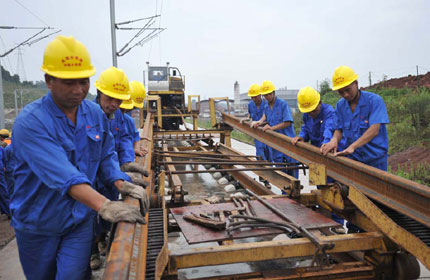Local boosts for properties can backfire
Updated: 2014-07-09 07:02
By XIN ZHIMING (China Daily)
|
|||||||||||
Moreover, the slowing economy and the widespread expectation of a new "economic norm" of sustained slower growth constitute the biggest hurdle for property sales. Unlike some years ago, when people talked about how much more the prices of their properties might rise, people are now discussing whether the market downturn spells a real estate Armageddon that will trigger a full-blown economic crisis in China.
The changing economic fundamentals have changed people's general expectations for the real estate sector. It is similar to what happened in 2008, when the global financial crisis battered the Chinese economy and suddenly demand for real estate seemed frozen and sales slumped.
 |
This time, however, the central government will not repeat what it did during the 2008 crisis and launch massive stimulus programs, for fear of stoking liquidity and inflation. Developers, therefore, will have to rely on local policies for support in order to survive their current woes.
Local governments, meanwhile, have no other option but to help revitalize the market, since the real estate sector and related industries are the main contributors to local revenues.
The question is, will such local policy boosts bail out the developers this time?
Media reports show that some local governments plan to encourage people to buy more properties and make the banks cut interest rates for mortgages. Price cuts by developers will also be banned so that there is no chain effect from price cuts in the market.
Such measures, if implemented, are set to play a role in temporarily boosting the local property market. But just as drugs cannot ensure the long-term performance of an athlete, such boosts will not bring prosperity to the real estate market in the long run.
Such planned market intervention is risky. By postponing the inevitable, it affects the normal functioning of the market and will only backfire in the future. If that happens, local governments will have to spend more to clean up the mess.
The author is a senior writer at China Daily.
Related Stories
Investment slows amid cooling Chinese property market 2014-07-07 10:02
Bulk property investment in Shanghai falls 14% 2014-07-04 08:02
Developers sweeten deals to attract buyers 2014-07-03 07:41
Real estate prices decline for a second consecutive month 2014-07-02 07:11
Housing stimulus unsustainable 2014-07-01 07:40
Home sales in Beijing decline by almost half 2014-07-01 07:38
Today's Top News
China, Germany join hands to drive growth
Meet foreigner breed of workers
Product placement deal backfires
From Westlife to the East
Gambling costs World Cup fans their lives
US supports Ukraine's decision to suspend ceasefire
It's all about making a spectacle
China likely to see 7.5% growth in second quarter
Hot Topics
Lunar probe , China growth forecasts, Emission rules get tougher, China seen through 'colored lens', International board,
Editor's Picks

|

|

|

|

|

|






